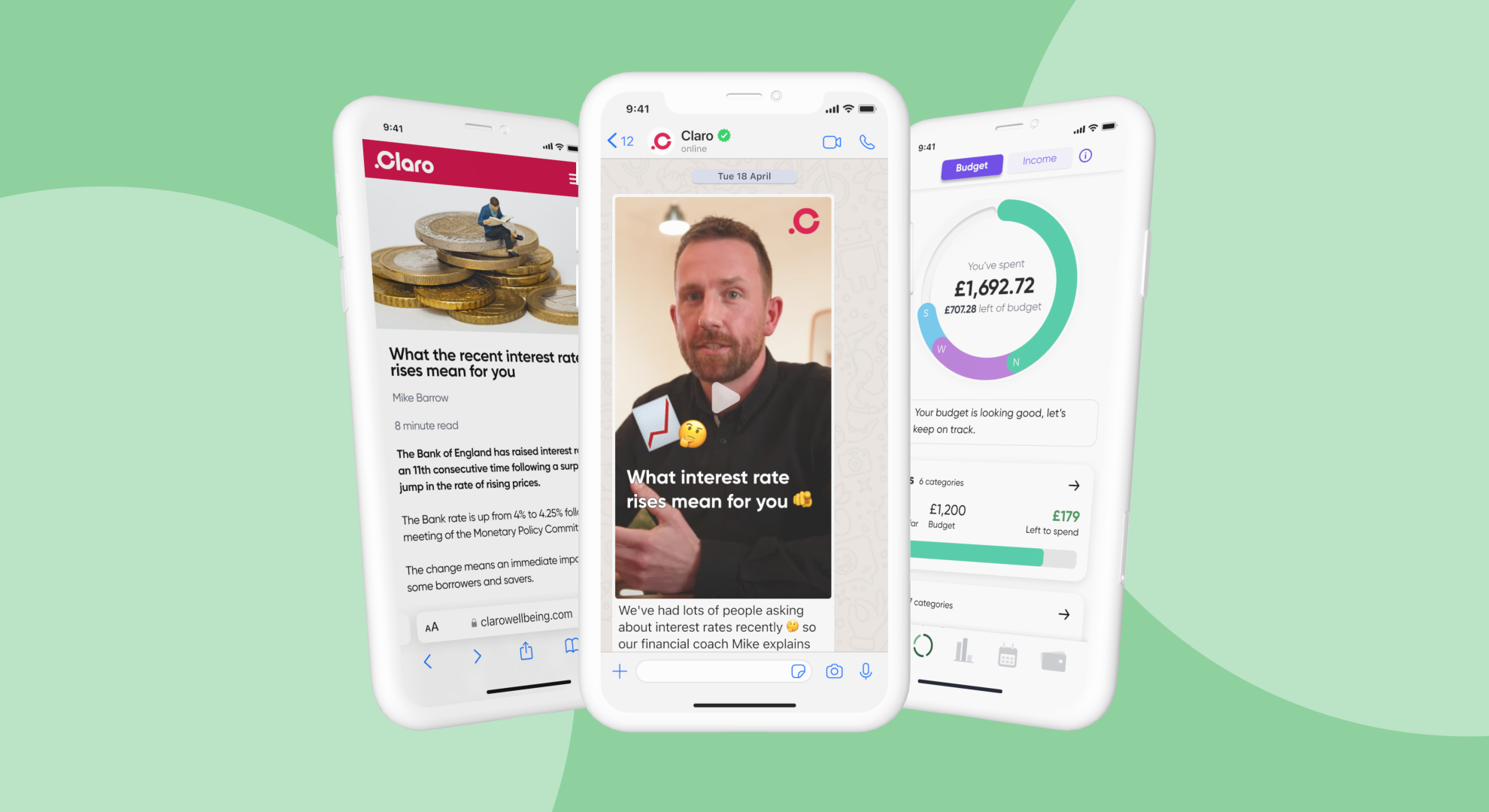6 min read
Should employers acknowledge Blue Monday?
Blue Monday (15 January) has a mixed reputation. But there’s still value in using the day to raise awareness of mental health and wellbeing...
7 min read
 Oliver Gudgeon
26-35-2023
Oliver Gudgeon
26-35-2023

Here, we’ll cover our six top tips about how to improve financial wellbeing, so you can start feeling more financially secure and less stressed about money.
We’re all some way into our lifelong relationship with money. And whether we have a good relationship with money depends on our daily habits.
|
If you’re an employer, you can also improve financial health for the people that work for you by reading our tips on improving employee financial wellbeing. |
None of these tips is effortless. But stick with it. Be consistent. And progress will come.
Let’s dive in.
Start with assessing where you are.
If you're not keeping track of your daily spending as well as where your wealth is held, it's a great thing to start doing. Here's one way you can get going: make a one-page money diagram.
Get some paper and a pen and make a list of all the financial accounts you have, how much is in each and where your money comes from and where it goes each month.
You can group all of this into the following categories:
A) Wealth (all your money accounts and the total you hold in each)
B) Outgoing monthly payments (your rent, mortgage, bills)
C) Income (money coming in from work, benefits payments or your pension each month)
Put as much detail down as you can into each category. For example, you could list it all out like this (we've filled in some random numbers as an example):
| Wealth | Income | Outgoing payments |
|
Bank accounts (e.g. Natwest, Starling...) – £5,000 Investments and ISAs (e.g. Vanguard...) – £10,000 Assets (crypto) – £200 |
Your job (£1,900/ month) Side hustle (£100/month) |
Rent (£650/month) Bills (£130/month) Groceries (£200/month) Insurance (£40/month) |
|
TOTAL: £15,200 |
£2,000 |
£1,020 |
A financial goal can be any end state that you want to achieve with your money. It could be almost anything. Here are some of the most popular:
But these goals are quite generic. If you want to improve your odds of achieving your goal, you’ll need to make it more specific.
Here’s a better way to develop a financial goal.
It’s normal for a financial goal to feel difficult to achieve – but you’re much more likely to achieve it if you do it right. Writing your goals down makes you 42% more likely to achieve them, according to study from the Dominican University of California.
Use the SMART goal-setting method. Yes, another acronym in your life. But we promise this one’s worth knowing (if you don’t already!).
Specific – be clear to yourself about what you want to achieve.
Measurable – make sure you can measure your goal, so you know you’re getting closer to achieving it.
Attainable – know the actions you can take to achieve the goal. For example, save money every month, open a savings account, or get a pay rise.
Realistic – be pragmatic and sensible about what you want to achieve. You are far more likely to achieve a goal and stick to it if you feel it’s realistic.
Time-bound – put a deadline on it. That way you’re more likely to consistently work towards achieving your goal.
OK, let’s take a generic goal into a SMART goal.
Buy a house.
At the moment, this goal has very little actual information. Look at it.
Let’s make it more specific.
Buy a house in Folkestone within 5 years.
Better.
Is it measurable?
Not really. How do we know if our financial habits are helping us work towards it? (We don’t.)
The average house in Folkestone is £280,000, according to Rightmove. To have a 10% deposit, you’d need to save £28,000.
But that’s if you buy it today. Let’s say house prices will go up 3.5% per year for the next 5 years.
Today 280,000
In 1 year: 289,800
2 years: 299,943
3 years: 310,441
4 years: 321,306
5 years: 332,552
So, you would need to save a deposit of around £33,000. Across 5 years (or 60 months), you’d need to save around £550 per month.
Buy a house in Folkestone within 5 years by saving £550/month.
Perfect. Your goal is now measurable. You know you’re reaching it if, every month, you save £550.
OK, is this attainable?
Let’s say you plan to save with your partner and, currently, you each make £30,000 per year. If you can each save £275, then your goal is attainable.
Now, is it realistic – is it likely to happen?
Saving for a deposit is just the start of buying a house. The average mortgage length is 25 years. If you can keep up with mortgage repayments, then your goal is certainly realistic.
Finally, you know your goal is time-bound, because you’ve set yourself a 5-year target date, and you even have a monthly saving target.
Of course, this is all very rough and subject to interest rates and the mortgage you're offered.
But this is now a well-developed goal. And you can apply this process to any financial goal you're saving for. Simply start with your generic goal, and start working out some of the details.
Budgeting is one of the best long-term habits you can build.
It’s particularly powerful when you separate your transactions into three sections:
Budgeting helps you get in control of your spending. It means you can see all your day-to-day transactions, while knowing exactly how you’re doing each month in relation to your overall budget.
If you’re a company employee, your employer can give you access to our open banking-enabled budgeting tool. We also have on-demand courses in our financial wellbeing platform dedicated to budgeting.
“Every action you take is a vote for the type of person you wish to become. No single instance will transform your beliefs, but as the votes build up, so does the evidence of your new identity.”
James Clear, Atomic Habits
Good financial habits help you achieve your financial goals. Bad financial habits stop you from achieving your financial goals.
So, let’s discover how we can build good financial "atomic habits".
According to James Clear, author of the bestselling book Atomic Habits, the best way to build and retain new habits is to think of them as part of your identity.
Financial goals are great for giving you a north star. But you should see achieving your financial goals as good outcomes, not end destinations.
To build a better relationship with your personal finances, try to figure out what identity you’d like to have.
James Clear breaks this thought-process down into two steps:
You’re probably thinking that sounds easier said than done. You can’t just wake up and decide you’re Warren Buffett, and then adopt the habits of a billionaire.
Fortunately, we’re not talking about a complete identity makeover. No – you can base your identity on your goals.
Let’s take the one-sentence goal you created and weave your identity into it.
Here’s an example.
Buy a house in Folkestone within 5 years by saving £550/month.
You can then use your new identity to question and become conscious of, any current financial habits you have.
For example, if you find yourself considering buying something new, but are not sure you need it, ask yourself: “Would a kind of person who regularly saves money towards their house deposit buy this item?”
Do this every time you spend money. That is, make it a habit.
It takes a bit of time to become more conscious of your financial habits, but it’s worth it. Build financial atomic habits around the person you want to become, and you’ll feel more in control of your financial goals.
This one's a relatively simple point. If you’re not in debt, but you don’t have an emergency fund – sometimes called a rainy-day fund – it’s time to build one.
Everyone should have an emergency fund. You don’t know when you’re going to need to cover your costs for a few months at a moment's notice.
Each of us can have a good or bad relationship with money, regardless of how much we earn, where we live and what we do. The key is to develop a healthy way of thinking about money – a healthy mindset.
If you have financial goals you want to achieve or want to feel more in control of your money, you need to identify limiting beliefs.
“I’ll never have as much money as person X”
“I’ve never been good with money”
“You need money to make money”
“I don’t deserve to be wealthy”
“I don’t have enough money to save or invest”
“Money is the root of all evil”
“It’s not possible to buy a house with my salary”
“Investing is gambling”
Beliefs like these are of no help to anyone because they shortcut our thinking, preventing us from addressing our obstacles.
Why do we have limiting beliefs?
The truth is, our brains like to simplify everything, usually doing one of three things:
We just can't render all the information we come across with 100% accuracy.
So, how do we overcome these beliefs?
Start by noticing limiting beliefs
Be conscious of any time you feel your innermost thoughts resisting an idea. When are you saying no to things that you could say yes to? When do you feel uncomfortable with things? When do you feel your internal dialogue is negative?
Question limiting beliefs
Once you can recognise your limiting beliefs, try asking yourself if each is helping you achieve your financial goals. If you still had a given limiting belief in a year’s time, what could it cost you physically, financially or emotionally?
Create new beliefs
When you think about money, think about what kind of beliefs work for other people.
What would your first two steps be to test your new belief? What kind of person would you need to be to try out your new belief?
Think back to a time when you overcame a tough challenge or task, or achieved something great. What did you learn about yourself from that experience?
Reframing limiting beliefs can be difficult. Especially if we’ve had them for a long time.
To sum up, our tips for improving your financial wellbeing are:
1. Figure out where you are
2. Set SMART goals for your future
3. Get started with budgeting
4. Analyse and improve your habits around money
5. Build an emergency fund
6. Reframe limiting beliefs
Are you a rewards and benefits leader?Financial wellbeing? There's an app for that.* |
 |
|
*Well, technically, it's a web app. But if you want to move your financial wellbeing programme (and organisation) forwards, it's the best one to use. (Yes, according to our marketing team.) |

6 min read
Blue Monday (15 January) has a mixed reputation. But there’s still value in using the day to raise awareness of mental health and wellbeing...

4 min read
Ever wished you had a money-whiz friend you could ask anything, as often as you like?

7 min read
Millions are being impacted by financial stress. Yet, until now, workers in frontline occupations have not been able to benefit from educational...